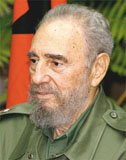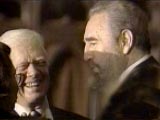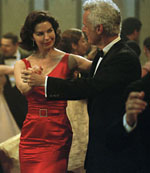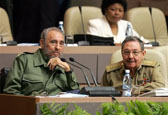Castro’s not dead yet .. but maybe Cuba should finally become part of Canada anyway?
Aug 2nd, 2006 | By Dominic Berry | Category: Countries of the World No doubt it is just the summer heat. But the news that Fidel Castro has just appointed his brother Raul as temporary custodian of Cuba, while Fidel recovers from surgery, has set off its own brand of crazed speculation in the true north. TV reports from across the border say that CNN has been interviewing some Cuban American exiles in Miami, who hope that the almost 80-year-old Fidel’s ultimate demise, whenever it comes, will just be a prelude to Cuba’s admission as the 51st state of the union. And on hearing such news, at least some Canadians are bound to wonder: Wouldn’t it make slightly more sense for Cuba to become the 11th sovereign province of Canada instead?
No doubt it is just the summer heat. But the news that Fidel Castro has just appointed his brother Raul as temporary custodian of Cuba, while Fidel recovers from surgery, has set off its own brand of crazed speculation in the true north. TV reports from across the border say that CNN has been interviewing some Cuban American exiles in Miami, who hope that the almost 80-year-old Fidel’s ultimate demise, whenever it comes, will just be a prelude to Cuba’s admission as the 51st state of the union. And on hearing such news, at least some Canadians are bound to wonder: Wouldn’t it make slightly more sense for Cuba to become the 11th sovereign province of Canada instead?
The quick background on Fidel’s operation and what it may mean …
 According to the Washington Post, there are “Numerous Medical Possibilities” in the slender and somewhat cryptic information about Fidel Castro’s operation that has so far been made public by the Cuban authorities. I.e., who knows just what is really going on?
According to the Washington Post, there are “Numerous Medical Possibilities” in the slender and somewhat cryptic information about Fidel Castro’s operation that has so far been made public by the Cuban authorities. I.e., who knows just what is really going on?
A good report from the Canadian Press summarized what was at least publicly known in the immediate wake of the surgery, on August 1, 2006. And then an August 2 piece in the Toronto Globe and Mail (“With reports from Associated Press, AFP and Cox”) encapsulated the broadest dimensions of the story, with the headline: “Castro’s illness plunges Cuba into uncertainty.”
In any case, the obvious bottom-line question about Cuba today has at least now been raised a little more acutely than ever before. As summarized by the Guardian, in the wise old anglophone kingdom across the sea: “What happens after Fidel Castro?“
 As seen from inside the present regime in Cuba itself, the present regime will of course just carry on. Fidel’s already appointed successor is his brother Raul. And at most, it seems, Raul Castro may open up Fidel’s current rather tight socialist authoritarian style somewhat – especially economically, on a kind of Chinese model, while retaining essentially the same political system.
As seen from inside the present regime in Cuba itself, the present regime will of course just carry on. Fidel’s already appointed successor is his brother Raul. And at most, it seems, Raul Castro may open up Fidel’s current rather tight socialist authoritarian style somewhat – especially economically, on a kind of Chinese model, while retaining essentially the same political system.
At the same time, Raul is now 75 years old himself. While he may be a tough administrator and an able technocrat, he lacks Fidel’s charisma and is apparently not wildly popular among even those Cuban people who actually live in Cuba (as opposed to the US State of Florida, a not-very-long boat ride away).
As further explained by the Guardian: “Many anticipate” that even if Fidel does not recover quite handily from his surgery and resume control (as the official spin inside Cuba has it at the moment) his brother Raul’s “leadership will be nominal or short-lived.
 “The three other – younger – names most frequently mentioned as likely to take over the running of government are those of Ricardo Alarcon, 69, president of the national assembly, former UN ambassador and the most public face of the government; Carlos Lage, 54, the vice-president; and “Felipe Perez Roque, the 41-year-old foreign relations minister and Castro’s loyal former chief of staff.” They may or may not be open to some further degree of both economic and political change.
“The three other – younger – names most frequently mentioned as likely to take over the running of government are those of Ricardo Alarcon, 69, president of the national assembly, former UN ambassador and the most public face of the government; Carlos Lage, 54, the vice-president; and “Felipe Perez Roque, the 41-year-old foreign relations minister and Castro’s loyal former chief of staff.” They may or may not be open to some further degree of both economic and political change.
There are also, of course, much more imaginative scenarios than this. They run all the way from the schemes of Osvaldo Paya’s “Varela Project” – which has “called for freedom of elections, speech and association and the ability to start private businesses” – to the aggressively right-wing designs of some Cuban exiles in Florida for “the reacquisition of property left behind” when Castro first took over in 1959, and various forms of “grand privatisation like in Russia.”
What about just joining the United States … or Canada?
 As explained by the Globe and Mail, the White House in Washington “was careful not to welcome Mr. Castro’s illness but made it clear it can’t wait for communism to be dead and buried in Cuba …
As explained by the Globe and Mail, the White House in Washington “was careful not to welcome Mr. Castro’s illness but made it clear it can’t wait for communism to be dead and buried in Cuba …
“We don’t know what the condition of Fidel Castro is. We don’t know the exact facts of this because Cuba is a closed society,’ said Tony Snow, President George W. Bush’s spokesman … The one thing we want to do is to continue to assure the people of Cuba that we stand ready to help.'”
At least some Cuban exiles who already live as US citizens in Florida do seem to think that the ultimate best-practice resolution of Cuba’s fate would be for the island to simply join the USA today, as the 51st state of the union.
There are a great many good reasons for doubting that this will ever happen (and/or that even President George W. Bush would welcome it), of course. But in the spirit of a mad and all too hot summer in many parts of North America, this does raise the slightly more sensible prospect that Cuba might finally become the 11th sovereign province of Canada instead?
The case for Cuba in Canada … or Canada in Cuba, etc …
 In the first place, Canada has not been part of the longstanding US embargo of Castro’s communist regime in Cuba. Canadians already frequently vacation in Cuba. (It offers an economical Caribbean holiday in the sun, long taken advantage of by young and not-yet-quite-so-affluent urban professionals in various parts of the true north.) And there is already a trade and wider economic relationship between Canada and Cuba.
In the first place, Canada has not been part of the longstanding US embargo of Castro’s communist regime in Cuba. Canadians already frequently vacation in Cuba. (It offers an economical Caribbean holiday in the sun, long taken advantage of by young and not-yet-quite-so-affluent urban professionals in various parts of the true north.) And there is already a trade and wider economic relationship between Canada and Cuba.
It is a plain fact as well that Fidel Castro’s best world-leader-friend in all the world was probably the former Canadian prime minister Pierre Elliott Trudeau (19681979, 19801984). Remember, e.g., Trudeau’s and Castro’s “first meeting in Cuba in 1976, which broke Castro’s isolation and ruffled US feathers.” Subsequently, the “two leaders saw each other regularly until well after Trudeau had left politics … Mark Entwistle, Canadian ambassador to Cuba between 1993 and 1997, remembered sitting at the dinner table with the two men as they talked the nights away – intellectual soul mates, definitely.'”
 Fidel made a very special point of attending Trudeau’s Montreal funeral early in October 2000 (along with former US President Jimmy Carter, it should be noted). There “Castro hailed Trudeau, the first NATO leader to visit Cuba, as a world-class statesman.'” And: “When the aging communist leader arrived at the basilica” where the funeral was held, “crowds shouted Viva Fidel!’.” (Meanwhile Jimmy Carter told a journalist that Trudeau was “the first person I invited to the White House after I was elected … He gave me some good advice.”)
Fidel made a very special point of attending Trudeau’s Montreal funeral early in October 2000 (along with former US President Jimmy Carter, it should be noted). There “Castro hailed Trudeau, the first NATO leader to visit Cuba, as a world-class statesman.'” And: “When the aging communist leader arrived at the basilica” where the funeral was held, “crowds shouted Viva Fidel!’.” (Meanwhile Jimmy Carter told a journalist that Trudeau was “the first person I invited to the White House after I was elected … He gave me some good advice.”)
All this may help explain some remarks from a 28-year-old Cuban called “Tito,” discreetly interviewed recently by the Guardian – and not so enthusiastic about just carrying on with the present regime on the island: “If someone sees me talking to you they will come and ask what were you talking to him about. You cannot speak freely. Many of us would like to go, not to Florida, but maybe to Canada or somewhere in Europe.”
As the Guardian also notes, other Cubans “point to” Fidel’s “much-admired health service and an education system that has brought the country the highest literacy rates in Latin America.” They stress that “we are not illiterate like we were before. We don’t want Miami here. Things are hard, things are difficult, but people are educated now and the people in Miami, they have been away so long they don’t know that.”
 So … just imagine. Suppose the rest of Canada finally did figure out an acceptable way of formally recognizing that while French-speaking Quebec is certainly a province of an altogether united Canada, it is at the same time “not a province like the others” (as virtually all its leaders have so long maintained). Might not the stage then be set for the admission of a Spanish-speaking Cuba that was also not a province like the others?
So … just imagine. Suppose the rest of Canada finally did figure out an acceptable way of formally recognizing that while French-speaking Quebec is certainly a province of an altogether united Canada, it is at the same time “not a province like the others” (as virtually all its leaders have so long maintained). Might not the stage then be set for the admission of a Spanish-speaking Cuba that was also not a province like the others?
Of course, you could say that two official languages are bad enough. Why go for three? Wouldn’t it make more sense for such English-speaking Caribbean places as Jamaica to become Canadian provinces not like the others instead? (And here it may also be worth noting that all of Fidel Castro, Jimmy Carter, and Pierre Trudeau [and Louis Farrakhan] attended former Jamaican Prime Minister Michael Manley’s funeral in Kingston, Jamaica in 1997. Though there is also jazz great Oscar Peterson’s recent troubling experience in Mississauga, Ontario – to quietly suggest that many Jamaicans might want to think twice about joining Canada, and so forth.)
On the other hand, English, French, and Spanish are now the three languages of the North American Free Trade Agreement. Why not make them the three official languages of Canada too? From the standpoint of the continuing anglophone majority in Canada, this would only mean hiring a few extra staff for the simultaneous translation service in the federal Parliament at Ottawa. And, it is probably also worth noting, Cuba’s present population is somewhat smaller than that of the present most populous Canadian Province of Ontario (which is very much like the others, and don’t you forget it).
Back to the cold and cruel real world … even in the deep summer heat …
 Of course, of course, of course … nothing like this is ever going to happen. And especially, no doubt, not while Stephen Harper’s new Conservative Party of Canada presides over even a very slender federal minority government in Ottawa.
Of course, of course, of course … nothing like this is ever going to happen. And especially, no doubt, not while Stephen Harper’s new Conservative Party of Canada presides over even a very slender federal minority government in Ottawa.
(Mr. Harper’s quite different current international project, it seems, is to somehow revive the old united British empire.)
But just thinking of the impossible in this case does seem to say something interesting about something that is bound to become increasingly important over the next number of years.
Fidel Castro – whatever you may or may not think of him – is not going to be living forever. (Though it has been pointed out that: “His father lived till age 84, his mother till age 92, and all of his siblings, including an older brother and sister, are still alive and healthy.”) What is going to happen to Cuba when he finally does pass from the scene?
In thinking about all this, it may be worth remembering as well that neither George W. Bush nor Stephen Harper is going to be in office forever either. (To say nothing of the new president-elect of Mexico.) And it is interesting how often Jimmy Carter’s name crops up in connection with Fidel Castro and Pierre Trudeau.
 However you look at it, Fidel Castro in Cuba no doubt has turned out to be one of the minor great disappointments of the 20th century. Shortly after he took power in 1959, the Observer in the UK urged that he represented “a new Latin America: democratic, Catholic and stable … His bearded, youthful figure has become a symbol of the continent’s rejection of brutality and lying and shoddiness.”
However you look at it, Fidel Castro in Cuba no doubt has turned out to be one of the minor great disappointments of the 20th century. Shortly after he took power in 1959, the Observer in the UK urged that he represented “a new Latin America: democratic, Catholic and stable … His bearded, youthful figure has become a symbol of the continent’s rejection of brutality and lying and shoddiness.”
This of course proved to be not quite true (or worse). But maybe it would have been closer to the truth, if the likes of Jimmy Carter and Pierre Trudeau had enjoyed more influence over the growth and development of North America during the last half of the 20th century than they finally did. It is probably time to start praying that in the first half of the 21st century, their seriously free and democratic heirs and successors will have better luck.
(And certainly here’s praying too for “Rafael, a middle-aged Cuban mechanic,” who recently told the Guardian: “I hope we can change without any bloodshed.”)

